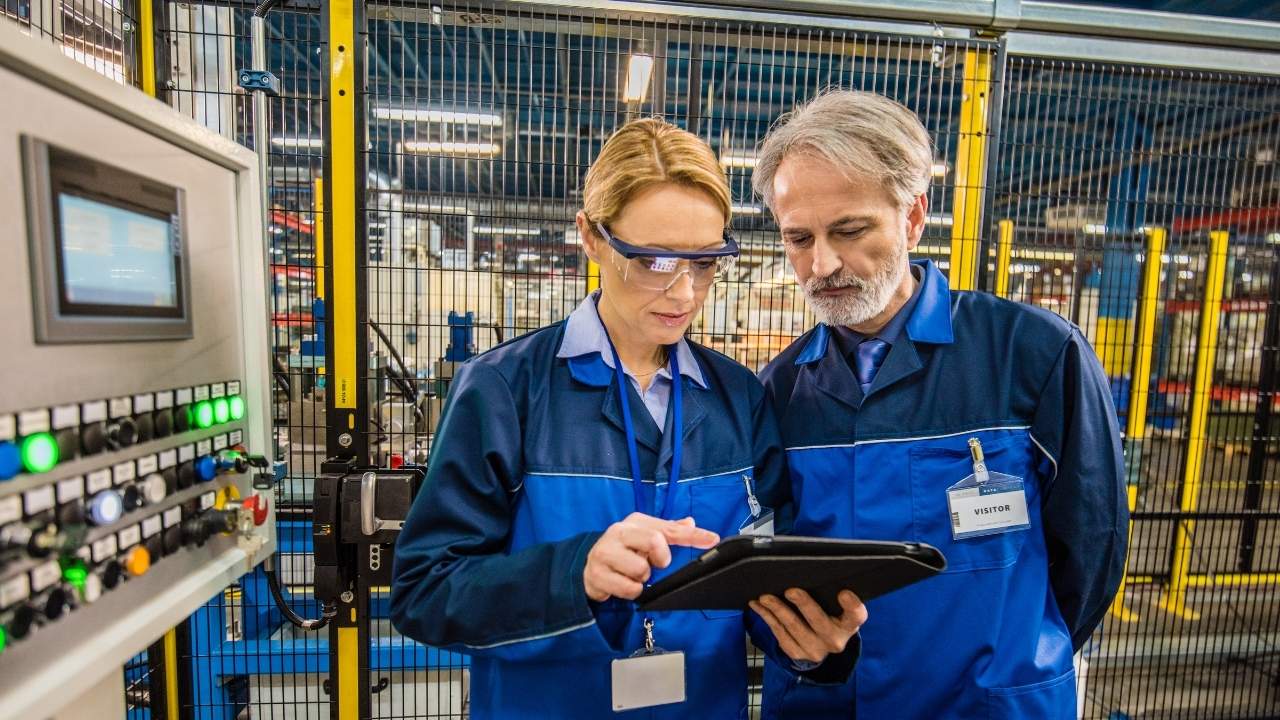Discover the benefits of ERP for industrial machinery and equipment manufacturing. Enhance quality, boost efficiency, and achieve significant cost savings with integrated solutions tailored to your industry.
Industrial machinery and equipment production involves highly complex supply chains with thousands of parts sourced from global suppliers that must seamlessly integrate across assembly lines involving intricate manufacturing processes. Enterprise Resource Planning (ERP) software has become an essential technology for manufacturers of industrial machinery and equipment to manage their complex operations. Coordinating and optimizing inventory, planning, production scheduling, quality control, and delivery across such a vast operation is impossible without a digital backbone provided by ERP software.
By connecting data across the extended supply chain and providing real-time cross-functional analytics, ERP gives unprecedented visibility over the end-to-end business. Manufacturers leverage this to identify inefficiencies and prevent potential problems before they cause costly disruptions. ERP also models the financial aspects alongside operational metrics for holistic decision-making to maximize profitability.
The capabilities of ERP that enable such multifaceted performance improvements for industrial machinery and equipment manufacturers are explored throughout this article.
ERP Benefits for Industrial Manufacturing: Transforming Inventory and Warehouse Management
For manufacturers handling thousands of spare parts and materials, inventory management is enormously complex. ERP software provides unified real-time visibility over stock levels across all locations & warehouses. It generates inventory reports, tracks orders, and automates replenishment. This improves inventory control and significantly reduces waste. ERP software brings order to this chaos by linking inventory data to production schedules, sales orders, and procurement plans. Smart classification, cataloging and tagging of items using barcodes and RFID enables real-time tracking across warehouses.
By providing complete inventory transparency, ERP prevents shortages through better demand forecasting and safety stock optimization. Lean reordering also reduces excess stock. Sophisticated slotting algorithms assign optimal storage locations in warehouses to minimize handling costs. Combined with directed picking strategies, this cuts errors and improves accuracy.
ERP Benefits for Industrial Manufacturing: Optimizing Production Planning and Scheduling
ERP tools provide master production scheduling, detailed capacity planning, and optimized job scheduling. By aggregating live data on upcoming orders, available machinery, workforce skills, and production constraints, ERP enables industrial equipment manufacturers to create optimal production plans and schedules. ERP helps assess capacity utilization across assets while balancing load distribution to avoid bottlenecks.
Simulating different scenarios, manufacturers can stress-test plans to maximize output and machinery uptime while ensuring on-time order delivery. This is invaluable for industrial equipment OEMs relying on distributed supply chains with outsourced manufacturing, multiple warehouses, and global logistics networks.
ERP Benefits for Industrial Manufacturing: Driving Down Costs enterprise-wide
ERP software enables notable cost savings for industrial machinery and equipment manufacturers in multiple ways.
Firstly, optimized planning and scheduling prevent overproduction and excess work-in-process and finished goods inventory – eliminating waste-related costs.
Secondly, increased quality minimizes rework and returns.
Thirdly, ERP provides granular visibility over operations, facilitating fact-based decision-making to reduce expenses.
Thus, ERP implementation leads to substantial cost savings from reduced wastage, better inventory control, improved capacity utilization, and greater labor productivity. ERP analyzes past expenditure and consumption patterns enterprise-wide to identify savings opportunities.
ERP Benefits for Industrial Manufacturing: Supporting Multiple Production Environments
Machinery OEMs often juggle outsourced, in-house, and collaborative production. ERP helps manage this operational complexity through integrated solutions tailored for each scenario:
- Outsourced Production – Assign, schedule, and track orders across multiple vendor facilities while maintaining oversight through inventory management, costing, quality protocols, and more.
- In-House Production – Optimize utilization of own production facilities through planning tools for floor space, asset allocation, labor assignment, inventory balancing, and logistics.
- Collaborative Production – Jointly manage operations, inventory, scheduling, costs, and capacity sharing across partner facilities under long-term production-sharing contracts. Gain end-to-end visibility across the collaborative ecosystem.
The Multifaceted Value of ERP for Key Industrial Manufacturing Processes:
While the benefits described so far are cross-cutting, ERP also enhances several key production areas as explored below:
MRP and Inventory Optimization: By aggregating bills of materials (BOMs) across products and production stages, ERP provides unmatched visibility over inventory demand and supply. Manufacturers leverage this for accurate material requirements planning (MRP), preventing shortages while cutting excess raw material stocks. Combined with directed put-away and picking, ERP further bolsters inventory accuracy and velocity.
Job-Work and Outsourcing Management: For manufacturers that outsource certain production operations, ERP links outsourced job orders into the central schedule. This facilitates vendor coordination to ensure timely deliveries that don’t delay overall production. Purchase orders, bills of material, routing steps, and completion dates are visible across the supply chain.
Quality Inspection and Control: ERP centralizes quality data from automated inspection equipment and manual checks, providing real-time visibility over critical variables. Production managers leverage this to rapidly address defects and minimize rework through root cause analysis. ERP further helps uphold quality standards by managing equipment maintenance and calibration schedules.
Multiple Production Houses: For manufacturers operating multiple domestic or international production facilities, ERP links to inventory, scheduling, and operations data across all sites. This allows leadership to optimize production loads between plants based on capacity, costs, lead times, and other constraints to maximize responsiveness and profitability. ERP also aids technology transfer between sites.
Supporting Multiple Warehouses and Improving Logistics
Manufacturers often operate multiple warehouses across geographies to be closer to key markets. ERP software seamlessly integrates all these facilities onto a unified platform for holistic inventory oversight.
Zonal and regional warehouse managers can fulfill orders from local stock while lean reordering policies ensure parts are redistributed optimally between locations. Integrated logistics management also enables better shipment routing, carrier selection, and freight optimization.
Enabling Batch Management for Component Traceability
Industrial machinery consists of thousands of components that need to be tracked for quality and traceability. ERP helps group components into batches with unique IDs right from raw material procurement through work-in-progress stages to final assembly.
Any quality issues detected during testing or customer use can be traced back to specific component batches. This pinpoints problems emerging from specific suppliers, materials, or production cycles. Corrective actions then focus on finding batch-specific root causes rather than tackling broader quality issues.
Supporting Customization and New Business Models
For manufacturers facing demand for more customized and flexible solutions, ERP facilitates the rapid launch of new products and services. The software readily adapts to accommodate unique industry or customer needs, ensuring a personalized solution. ERP also helps manufacturers adapt to equipment-as-a-service (EaaS) business models, where customers access machinery via subscriptions or usage-based pricing rather than outright purchases. By supporting dynamic pricing and billing models while providing the back-office functionality to manage pay-per-use equipment, ERP enables such service-based business transformations.
Facilitating Faster Stock-Taking
ERP enables both cycle counting and annual stock-taking processes through barcode scanning and RFID tracking of inventory movement. Actual physical inventory numbers are then compared with book values in the ERP software for stock reconciliation.
Discrepancies can be investigated through the inventory movement audit trail while write-offs help align books with actual stock. This keeps inventory data clean, accurate, and reliable year-round.
Versa Cloud ERP: The Future-Ready Solution for Industrial Manufacturing Businesses
For industrial machinery and equipment manufacturers seeking a comprehensive ERP solution to unlock the benefits detailed in this article, Versa Cloud ERP software is an optimal choice.
Purpose-built for manufacturers, Versa seamlessly handles complex inventory and warehouse operations using barcode scanning, RFID tagging, slotting, and dynamic picking algorithms. Versa centralizes data across inventory, warehouses, suppliers, production lines, and deliveries to provide unmatched real-time visibility and coordination. Configurable dashboards deliver actionable insights to drive data-driven decisions for maximized efficiency, quality, and profitability. This provides complete inventory transparency while optimizing storage and order processing workflows.
Natively supporting third-party logistics (3PL) and distributed, multi-site operations, Versa ERP enables centralized oversight over outsourced partners and remote facilities from procurement through production, warehousing, and final delivery.
With pre-configured modules for industrial manufacturing, Versa gets operational quickly even as it adapts to each customer’s unique needs through flexible customization.
Finally, Versa delivers all this cutting-edge functionality via a cloud delivery model. By simplifying deployment and enabling access to real-time data anywhere, cloud ERP reduces upfront costs while providing scalability to readily accommodate business growth. The cloud also minimizes reliance on internal IT infrastructure for a streamlined, hassle-free ERP experience.
To experience Versa’s user-friendly interface and see how it streamlines operations for industrial machinery and equipment manufacturers, schedule a personalized free demo today. Versa’s industry experts are ready to answer your questions and illustrate how the software can optimize your workflows.
FAQs covering commonly asked questions about ERP for industrial machinery and equipment manufacturing:
1. How can ERP software help with managing growing manufacturing complexity?
ERP tools like advanced planning and scheduling, production costing, quality lifecycle management, and automated data capture powered by IoT sensors simplify operational management despite increasing manufacturing complexity from global operations, outsourcing, automation integration, and frequent product changes.
2. What payback period can industrial machinery companies expect from ERP implementation?
While payback periods vary based on the scale of implementation and process changes, most industrial machinery and equipment manufacturers see complete ROI realization between 8-14 months after ERP roll-out through measurable improvements in efficiency, costs, quality, and customer service.
3. Does ERP software require extensive IT capability for implementation and management?
Leading cloud-based ERP solutions like Versa Cloud ERP are designed for quick rollout even for teams without extensive IT skills. Intuitive dashboards, workflows, reports, and self-service customization enable line-of-business owners to drive adoption with minimal reliance on IT staff.
4. Can ERP integration challenges be overcome?
Modern ERP systems like Versa provide pre-built connectors, APIs, and cloud interchange tools for integrating with existing business applications ranging from production equipment sensors to CRM software. This makes integration seamless without needing any coding or complex interfacing.
5. How can manufacturers evaluate the right ERP software for their needs?
Every manufacturer must create a detailed inventory of their key pain points, must-have features, and workflow requirements so vendors can demonstrate how their solutions map to the documented needs during product demos. This eliminates guesswork and ensures the chosen ERP platform addresses the most critical operational gaps.
Empower your business with the knowledge to navigate the realm of an Integrated ERP solution, specifically tailored to your business needs. Gain insights, streamline processes, and propel your financial management to new heights with this comprehensive guide
With Versa Cloud ERP’s Implementation guide learn how a business can ensure a successful ERP Solution Implementation. Navigate the complexities of implementation with confidence!
Effectively manage your financials, accounting, inventory, production, and warehouse management workflows with our award-winning ERP.
Let Versa Cloud Erp’s do the heavy lifting for you.
[widget id=”custom_html-40″]
[widget id=”custom_html-42″]
[widget id=”custom_html-30″]
Do Business on the Move!
Make your businesses hassle-free and cut the heavyweights sign up for the Versa Cloud ERP today!!
Join our Versa Community and be Future-ready with us.
[widget id=”custom_html-20″]






